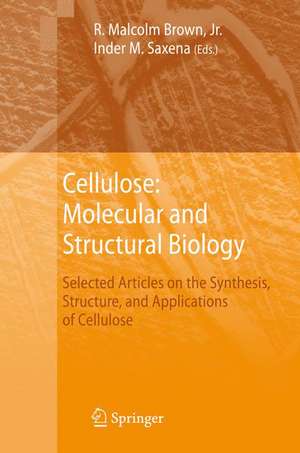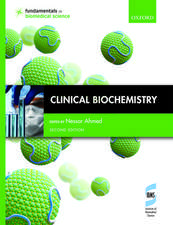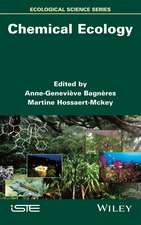Cellulose: Molecular and Structural Biology: Selected Articles on the Synthesis, Structure, and Applications of Cellulose
Editat de R. Malcolm Jr. Brown, Inder M. Saxenaen Limba Engleză Hardback – 4 apr 2007
Molecular, biochemical, and evolutionary aspects of cellulose biosynthesis are reviewed in a variety of living organisms, including cyanobacteria, eubacteria, (Acetobacter, Salmonella, and E. coli), vascular plants (including Arabidopsis, forest trees, and maize), and tunicates.
Phylogenetic analysis, molecular genetics, and the potential for metabolic engineering are also presented.
Novel structural approaches include the macromolecular structure of the synthesizing units, the terminal complexes as well as the cellulose product in its many forms are also included. Novel applications using cellulose include smart materials, carbonised cellulose, and biomedical applications.
First hand information from theleading researchers distinguishes this work from other books on cellulose.
| Toate formatele și edițiile | Preț | Express |
|---|---|---|
| Paperback (1) | 1042.74 lei 38-44 zile | |
| SPRINGER NETHERLANDS – 19 oct 2010 | 1042.74 lei 38-44 zile | |
| Hardback (1) | 1230.03 lei 6-8 săpt. | |
| SPRINGER NETHERLANDS – 4 apr 2007 | 1230.03 lei 6-8 săpt. |
Preț: 1230.03 lei
Preț vechi: 1500.04 lei
-18% Nou
Puncte Express: 1845
Preț estimativ în valută:
235.40€ • 244.85$ • 194.33£
235.40€ • 244.85$ • 194.33£
Carte tipărită la comandă
Livrare economică 14-28 aprilie
Preluare comenzi: 021 569.72.76
Specificații
ISBN-13: 9781402053320
ISBN-10: 1402053320
Pagini: 396
Ilustrații: XVI, 379 p.
Dimensiuni: 155 x 235 x 30 mm
Greutate: 0.8 kg
Ediția:2007
Editura: SPRINGER NETHERLANDS
Colecția Springer
Locul publicării:Dordrecht, Netherlands
ISBN-10: 1402053320
Pagini: 396
Ilustrații: XVI, 379 p.
Dimensiuni: 155 x 235 x 30 mm
Greutate: 0.8 kg
Ediția:2007
Editura: SPRINGER NETHERLANDS
Colecția Springer
Locul publicării:Dordrecht, Netherlands
Public țintă
ResearchCuprins
Many Paths up the Mountain: Tracking the Evolution of Cellulose Biosynthesis.- Evolution of the Cellulose Synthase (CesA) Gene Family: Insights from Green Algae and Seedless Plants.- The Cellulose Synthase Superfamily.- Cellulose Synthesis in the Arabidopsis Secondary Cell Wall.- From Cellulose to Mechanical Strength: Relationship of the Cellulose Synthase Genes to Dry Matter Accumulation in Maize.- Cellulose Biosynthesis in Forest Trees.- Cellulose Biosynthesis in Enterobacteriaceae.- In Vitro Synthesis and Analysis of Plant (1?3)-?-d-glucans and Cellulose: A Key Step Towards the Characterization of Glucan Synthases.- Substrate Supply for Cellulose Synthesis and its Stress Sensitivity in the Cotton Fiber.- A Perspective on the Assembly of Cellulose-Synthesizing Complexes: Possible Role of KORRIGAN and Microtubules in Cellulose Synthesis in Plants.- How Cellulose Synthase Density in the Plasma Membrane may Dictate Cell Wall Texture.- Cellulose-Synthesizing Complexes of a Dinoflagellateand other Unique Algae.- Biogenesis and Function of Cellulose in the Tunicates.- Immunogold Labeling of Cellulose-Synthesizing Terminal Complexes.- Cellulose Shapes.- Nematic Ordered Cellulose: Its Structure and Properties.- Biomedical Applications of Microbial Cellulose in Burn Wound Recovery.- Cellulose as a Smart Material.
Textul de pe ultima copertă
Cellulose: Molecular and Structural Biology is an up-to-date treatise on the most advanced and provocative research into the biosynthesis, structure, and applications of nature’s most abundant macromolecule and renewable resource, cellulose.
Molecular, biochemical, and evolutionary aspects of cellulose biosynthesis are reviewed in a variety of living organisms, including cyanobacteria, eubacteria, (Acetobacter, Salmonella, and E. coli), vascular plants (including Arabidopsis, forest trees, and maize), and tunicates.
Phylogenetic analysis, molecular genetics, and the potential for metabolic engineering are also presented.
Novel structural approaches include the macromolecular structure of the synthesizing units, the terminal complexes as well as the cellulose product in its many forms are also included. Novel applications using cellulose include smart materials, carbonised cellulose, and biomedical applications.
First hand information from the leading researchers distinguishes this work from other books on cellulose.
Molecular, biochemical, and evolutionary aspects of cellulose biosynthesis are reviewed in a variety of living organisms, including cyanobacteria, eubacteria, (Acetobacter, Salmonella, and E. coli), vascular plants (including Arabidopsis, forest trees, and maize), and tunicates.
Phylogenetic analysis, molecular genetics, and the potential for metabolic engineering are also presented.
Novel structural approaches include the macromolecular structure of the synthesizing units, the terminal complexes as well as the cellulose product in its many forms are also included. Novel applications using cellulose include smart materials, carbonised cellulose, and biomedical applications.
First hand information from the leading researchers distinguishes this work from other books on cellulose.
Caracteristici
World leading scientists in this and related fields present their most recent work The leading and most updated reference book on cellulose Includes supplementary material: sn.pub/extras













